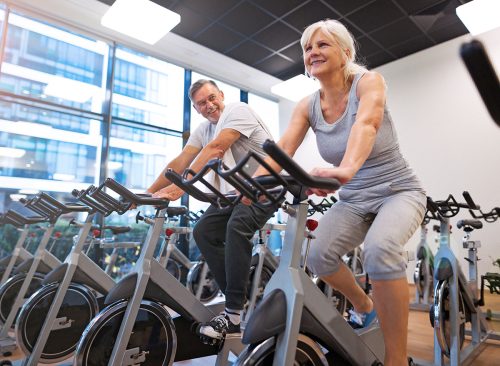Things to Never Do After Age 60, Say Experts
Don't let these mistakes take the shine off your golden years.

Youth may be wasted on the young, but as we mature, some of us make our bodies age faster than they should. It’s all too easy to slip into unhealthy habits that soon become comfortable patterns, and their familiarity belies the fact that they can seriously take the shine off your golden years. To achieve optimum health, these are five things experts say you should never do after age 60.
1
Let Yourself Get Too Lonely
1
Let Yourself Get Too Lonely

Being lonely doesn’t just feel bad—it can degrade your body’s most important systems. Research has found that loneliness can increase older adults’ risk of dementia by 50%. And brain health isn’t the only threat: A recent Finnish study found that men who reported feeling lonely over two decades were more likely to be diagnosed with cancer—and faced a worse outcome. Loneliness seems to cause a stress response in the body, which can lead to inflammation and an impaired immune system. Make an effort to socialize regularly with friends and loved ones, join activity groups, or volunteer.
2
Skip Your Vaccinations
2
Skip Your Vaccinations

Get your COVID booster ASAP when eligible, and make sure you’re getting all the other recommended vaccines for people over 60. (The chance of being hospitalized or dying from illnesses like influenza or pneumonia increases with age.) Talk to your doctor about getting vaccinated against the flu, pneumonia, whooping cough and shingles. The CDC says every adult should get an annual flu vaccine, and people over 60 are a priority group. The CDC also recommends two pneumococcal pneumonia vaccines for people 65 and older, and two doses of shingles vaccine for people over 50.
3
Lose Track Of Your Blood Pressure
3
Lose Track Of Your Blood Pressure

Your blood pressure is one of the most important sets of numbers you need to know (and have rechecked regularly). The American Heart Association says it should be 120/80 or below. (According to Harvard Medical School, that means more than 70 percent of men over age 55 technically have high blood pressure.) Over time, high blood pressure can weaken the walls of blood vessels, vastly increasing your risk of stroke, heart attack and dementia.
4
Skip Regular Exercise
4
Skip Regular Exercise

As we age, most of us tend to become less active, at the exact time our bodies need us to move more. Experts say that exercising regularly improves muscle tone and mass, decreases bone loss, improves memory, increases metabolism, and improves sleep. On the flipside, a sedentary lifestyle increases your risk of obesity, type 2 diabetes, stroke, cardiovascular disease, and dementia. The American Heart Association recommends 150 minutes of moderate-intensity exercise (or 75 minutes of vigorous exercise) each week. Some examples of moderate-intensity exercise include brisk walking, dancing, or gardening; vigorous exercise includes running, swimming, hiking or biking.
RELATED: 15 Things You Should Never Do at the Doctor’s Office, Say Doctors
5
Drink Too Much
5
Drink Too Much

A recent study found that 10 percent of people over age 65 engage in binge drinking, defined as having four or more drinks in one sitting. Excessive alcohol consumption increases the risk of cancer and heart disease at any age, but as we mature, there are even more reasons to moderate. With age, lean body mass decreases and bones weaken; a tipsy fall at 60 can cause a lot more damage than it did at 40. And being older brings a need for long-term medications that may lead to dangerous interactions with alcohol. To stay healthy, drink moderately or abstain. Experts say women should have no more than one alcoholic beverage per day, and men should limit themselves to two.














